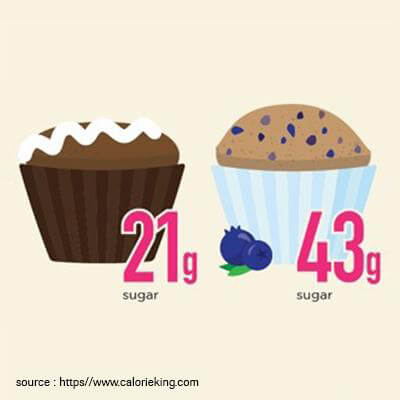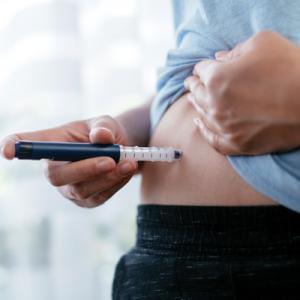Sweet Surprises
People living with diabetes often receive books, warnings and tips from healthcare professionals and dietitians about the importance of watching and counting carbohydrates (carbs). Carbs are important for people living with diabetes, but they shouldn’t be the only factor in your food choices. What about sugar, fat, sodium and cholesterol? And beneficial elements like fiber, protein, vitamins and minerals? Limiting foods high in sugar and carbs is a great start, but it doesn’t guarantee the best food choice every time. Why? Sometimes clever food packaging and image specialists can convince consumers a food choice is...
Read MoreSwitching from oral therapy to insulin
Has your healthcare provider talked to you about insulin? For many people, this can bring on mixed feelings and questions. There is a lot of information around type 2 diabetes and insulin available. However, trying to sort through it all might be overwhelming. There are a lot of feelings, opinions, and even myths around insulin. We’ve put together some key facts around type 2 diabetes and insulin. This will help you start to separate fact from fiction. The more you learn about insulin, the easier it will be to transition to it from orals. Some facts about insulin...
Read MoreOne Insulin Pump, Five Scenarios
Your insulin pump is a stalwart ally in everyday life, but some situations will require special attention (or a bit of ingenuity) from you; here are five examples. In the shower or bath. Most pumps are resistant to splashes, but cannot be submerged in water. You have two options: either disconnect your pump or find a safe place for it. If you choose the first option, check your blood sugar before and after the disconnection and don’t spend more than an hour without your pump. If you’d rather keep it with you, you can place it on the edge of the tub or in the soap...
Read MoreTeenagers And Diabetes: Diabetes Doesn't Clip Your Wings
Teenagers are building their self-image, experiencing new things and seeking validation from their peers. It shouldn’t be surprising that their lives with diabetes weigh heavily on them. Becoming responsible Teenagers may feel like rebelling against the whole routine surrounding their diabetes management. Blood glucose measures remind them that they’re different and give them the impression of being constantly monitored. They might want to avoid being confronted with the results of a measure so as not to feel discouraged or guilty. Here are some suggestions for easing the tension:...
Read MoreInsulin Injections: Breaking Down The Barrier
If insulin injections are part of your daily life, you know how essential they are to managing your diabetes and preventing complications. You also know that following your injection schedule is crucial. If your body doesn’t get enough insulin over the long term, you risk developing serious problems with your eyes, heart, nerves and kidneys. Getting too much insulin could lead to hypoglycemia—extreme cases of which can cause diabetic coma. Despite all this, according to a study conducted in the US, over half of people with insulin-dependent diabetes have deliberately skipped injections at...
Read MoreDemystifying injections
Diabetes is often associated with injections—whether it’s for capillary blood glucose testing, insulin injections or other injectable medications. In fact, in recent years, it is not only insulin that can be injected, but also other diabetes medications. Having to inject medication yourself can be unsettling for many people, but most people don't feel fear after a few times. Many people even breathe a sigh of relief after the first injection, because the injection is not as painful or complicated as they expected. Insulin and other injectable medications come in...
Read MoreSwitching from oral therapy to insulin
Has your healthcare provider talked to you about insulin? For many people, this can bring on mixed feelings and questions. There is a lot of information around type 2 diabetes and insulin available. However, trying to sort through it all might be overwhelming. There are a lot of feelings, opinions, and even myths around insulin. We’ve put together some key facts around type 2 diabetes and insulin. This will help you start to separate fact from fiction. The more you learn about insulin, the easier it will be to transition to it from orals. Some facts about insulin...
Read MoreOne Insulin Pump, Five Scenarios
Your insulin pump is a stalwart ally in everyday life, but some situations will require special attention (or a bit of ingenuity) from you; here are five examples. In the shower or bath. Most pumps are resistant to splashes, but cannot be submerged in water. You have two options: either disconnect your pump or find a safe place for it. If you choose the first option, check your blood sugar before and after the disconnection and don’t spend more than an hour without your pump. If you’d rather keep it with you, you can place it on the edge of the tub or in the soap...
Read MoreTeenagers And Diabetes: Diabetes Doesn't Clip Your Wings
Teenagers are building their self-image, experiencing new things and seeking validation from their peers. It shouldn’t be surprising that their lives with diabetes weigh heavily on them. Becoming responsible Teenagers may feel like rebelling against the whole routine surrounding their diabetes management. Blood glucose measures remind them that they’re different and give them the impression of being constantly monitored. They might want to avoid being confronted with the results of a measure so as not to feel discouraged or guilty. Here are some suggestions for easing the tension:...
Read MoreInsulin Injections: Breaking Down The Barrier
If insulin injections are part of your daily life, you know how essential they are to managing your diabetes and preventing complications. You also know that following your injection schedule is crucial. If your body doesn’t get enough insulin over the long term, you risk developing serious problems with your eyes, heart, nerves and kidneys. Getting too much insulin could lead to hypoglycemia—extreme cases of which can cause diabetic coma. Despite all this, according to a study conducted in the US, over half of people with insulin-dependent diabetes have deliberately skipped injections at...
Read MoreDemystifying injections
Diabetes is often associated with injections—whether it’s for capillary blood glucose testing, insulin injections or other injectable medications. In fact, in recent years, it is not only insulin that can be injected, but also other diabetes medications. Having to inject medication yourself can be unsettling for many people, but most people don't feel fear after a few times. Many people even breathe a sigh of relief after the first injection, because the injection is not as painful or complicated as they expected. Insulin and other injectable medications come in...
Read More





